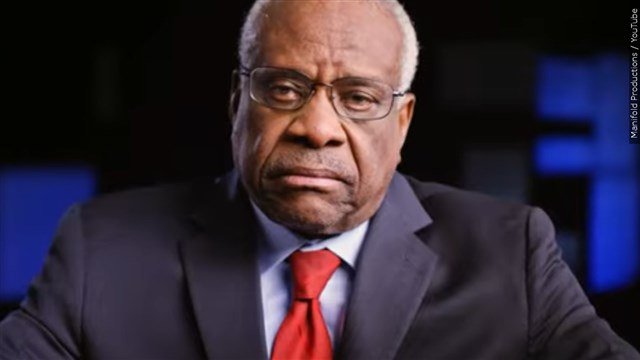Wyden, Whitehouse ask AG to appoint special counsel to investigate potential violations by Justice Clarence Thomas

WASHINGTON (KTVZ) -- Senators Ron Wyden, D-Ore., chairman of the Senate Finance Committee, and Sheldon Whitehouse, D-R.I., chairman of the Judiciary Subcommittee on Federal Courts, sent a letter to Attorney General Merrick Garland last week requesting the appointment of a Special Counsel to investigate potential violations of ethics, false statement, and tax laws by Supreme Court Justice Clarence Thomas and the benefactors who have supplied him with undisclosed gifts.
Wyden and Whitehouse write in their letter that the full pattern of Justice Thomas’ omissions of outside income and luxury gifts from his legally required financial disclosures warrant criminal investigation by the Department of Justice.
“We do not make this request lightly. The evidence assembled thus far plainly suggests that Justice Thomas has committed numerous willful violations of federal ethics and false-statement laws and raises significant questions about whether he and his wealthy benefactors have complied with their federal tax obligations. Presented with opportunities to resolve questions about his conduct, Justice Thomas has maintained a suspicious silence,” wrote Wyden and Whitehouse.
“No government official should be above the law. Supreme Court justices are properly expected to obey laws designed to prevent conflicts of interest and the appearance of impropriety and to comply with the federal tax code. We therefore request that you appoint a Special Counsel authorized to investigate potential criminal violations by Justice Thomas under the disclosure, false statement, and tax laws; pursue leads of related criminal violations by donors, lenders, and intermediate corporate entities; and determine whether any such loans and gifts were provided pursuant to a coordinated enterprise or plan,” concluded the senators.
The senators’ letter requests that a Special Counsel be appointed to determine whether Justice Thomas violated federal ethics and tax laws by failing to disclose as income more than $267,000 in forgiven debt.
An investigation by Chairman Wyden’s Senate Finance Committee uncovered that Justice Thomas failed to repay the principal of a $267,230.00 loan he used to purchase a luxury motorcoach. Justice Thomas did not disclose this forgiven debt on his ethics filings, as required by federal law, raising questions as to whether Thomas properly reported the associated income on his tax returns.
Despite repeated opportunities to explain this apparent omission to the Finance Committee and Whitehouse’s Senate Judiciary Subcommittee on Federal Courts, counsel for Justice Thomas has not provided a satisfactory response.
The letter also asks for a Special Counsel to review the many instances of undisclosed gifts given to Justice Thomas by billionaire benefactors. These gifts include multiple instances of free private jet travel; yacht travel; country club membership; luxury sports tickets; lodging; tuition for Justice Thomas’s grandnephew; and real estate transactions, home renovations, and free rent for Justice Thomas’ mother. The Ethics in Government Act required Justice Thomas to disclose all these gifts, but Justice Thomas failed to properly disclose them.
The letter notes that the omission of these gifts from Justice Thomas’ financial disclosures raises additional questions about what other gifts remain undisclosed and whether Justice Thomas’ benefactors properly reported such gifts for tax purposes where necessary. The letter points to reporting by the Washington Post that Leonard Leo secretly directed at least $25,000 to the firm operated by Justice Thomas’ spouse as evidence that additional investigation is needed to uncover the full scope of potential unlawful conduct related to any coordinated gifts program for certain justices.
The letter also points to several investigations and prosecutions by the Department of Justice of other government officials charged with less serious disclosure violations as evidence of prosecutorial precedent.
The text of the letter is here.